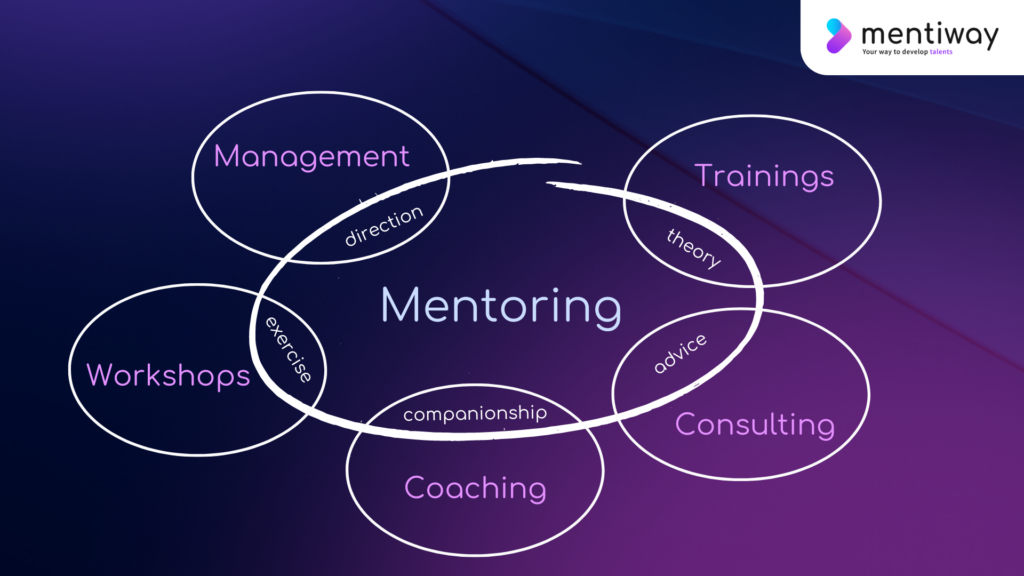Mentoring vs coaching – similarities and differences – a comparison
Mentoring as a form of talent development has been known in the US since the 1980s, or at least that’s when it was first formalized. It spread more widely in the 2000s through the public sector and education. Since then it has also become a permanent fixture in American and later British companies.
Organizations have noticed that people who have mentors have higher job satisfaction. In addition, mentoring uncovered one’s own potential, often changed one’s way of thinking, allowed one to get out of one’s own information bubble, improved job performance and solved problems that a subordinate did not always want to share with his or her supervisor.
In Europe, mentoring is just beginning to gain popularity. More and more programs are appearing in companies, at universities and run by various types of foundations. Still, the concept of mentoring is sometimes confused with coaching, consulting or informal one-on-one conversations over coffee. Therefore, in this article we will take a closer look at how mentoring differs from other forms of talent development.
Mentoring vs. coaching
In many aspects, indeed, coaching is similar to mentoring, but there are several differences that make us talk about two separate forms of developmental support.
The basic explanations of both terms are as follows:
Mentoring is a process in which an experienced employee, called a Mentor, provides support to a less experienced employee, the Mentee. It’s a more long-term engagement that aims to transfer knowledge, experience and skills. Mentoring builds trust and relationships between employees. .
Coaching, on the other hand, focuses on an individual’s personal and professional development. A coach helps an employee understand his or her goals and challenges and supports him or her in achieving them through questions and prompts. .
The differences arise primarily in the roles of Coach and Mentor. Namely, a Coach is a person with whom we learn, and a Mentor is someonefrom whom we can learn something. In other words, the Coach is supposed to inspire, to highlight the Coachee’s strengths. He or she is supposed to ask difficult questions, provoke thoughts, and help get out of the information bubble. The Mentor, on the other hand, also performs these tasks in part, but is primarily a person who has experience in a particular area and shares it with the Mentee.
In addition, the Coach, by virtue of his role, must be trained and experienced in the subject of coaching. He or she should be certified and preferably have as many sessions as possible. A mentor would also be good if he or she knew the proper coaching techniques, but this is not required to be effective in his or her role.
Also see what key roles and competencies Mentors and Coaches have.
The domain knowledge mentioned above is also a very important difference. The Coach does not need to “know” the area in which he will support the Coachee. When coaching, for example, in sales, the Coach does not need to be an outstanding salesperson. It is enough for him to appropriately ask questions and guide the Coachee to develop in this area. The Mentor, on the other hand, should definitely have significantly more knowledge and experience than the Mentee in the subject in which the Mentee wants to develop.
Mentoring combines elements of coaching, but supplements them with subject knowledge and experience. Among other things, the mentor during the session shows how he himself solved the problems that the Mentee is currently facing.
Mentoring vs. other forms of staff development
Although mentoring is most often compared to the previously mentioned coaching, it is also worth citing the differences between it and other forms of development.
Quite well in a buzzword way the comparison of mentoring to other forms of development is illustrated by the following diagram:

Mentoring is a form of talent development in which you will find all the best in training techniques, workshops, management, consulting, coaching and direct experience transfer.
And all this supported by building a relationship – gaining a partner with whom you can share your successes and seek methods to solve current and long-term problems, as well as face new challenges.
In contrast, the key differences between mentoring and other forms of development can be summarized in the following aspects:
- Duration and commitment: Mentoring is a long-term commitment, while coaching is often short-term. Training and workshops have strict time frames.
- Scope: Mentoring and coaching often focus on an employee’s personal and career development, while training and workshops focus on specific skills or knowledge.
- Form of interaction: Mentoring and coaching are based on a relationship between individuals, while training and workshops are often more structured and group-focused.
- Tailoring: Coaching and mentoring are more tailored to the individual employee’s needs, while training and workshops are more general in nature.
Mentoring also differs from other forms of development in the construction of the individual steps of the process.
- Defining Goals and Expectations: At the beginning of the mentoring process, the Mentor and Mentee should define what goals they want to achieve. Whether it’s developing specific skills, advancing their careers, or gaining a better understanding of a particular area of work, clearly articulated goals will help focus efforts on specific accomplishments.
- Mentor Selection: Choosing the right mentor is crucial. The Mentor should have knowledge, experience and skills related to the Mentee’s area of interest. It is also important that there is a good relationship and trust between Mentors and Mentee.
- Establish a schedule: The Mentor and Mentee should agree on how often and for how long they will meet. Meetings can be regular, such as weekly or monthly, depending on the needs and availability of both parties.
- Meetings and Conversations: During the meetings, the Mentor imparts knowledge, experience and guidance to the mentee. This is the time to ask questions, discuss professional challenges and discuss strategies for growth. It is important that the Mentee is open to feedback and ready to learn.
- Skills Development: The mentoring process should focus on practical skill development for the Mentee. The mentor may assign specific tasks or projects to complete so that the Mentee can practice her new skills in a real work environment.
- Monitoring Progress: Both the Mentor and Mentee should track progress toward established goals. Regular evaluations will help identify successes and areas that need further work.
- Completion of the process: The mentoring process may have a set duration – usually several months. Once the set goals have been achieved, the Mentor and Mentee can take stock of the process and decide whether to continue or end the mentoring, or continue the relationship on a different basis.
- Reflection and evaluation: At the end of the process, it is useful to conduct a reflection and evaluation. Mentor and Mentee can discuss what was accomplished, what lessons were learned, and what steps are worth taking next.
Mentoring as Coaching+
Mentoring is often referred to as an extension of coaching. It includes what is inherent in coaching, i.e., a one-to-one relationship, creating bonds, seeking the inner potential in the Coachee/Mentee. The goal is to broaden perspectives, to grow and learn, to deepen self-awareness, complemented by the subject matter expertise of the Mentor.
The Mentor has knowledge and experience that coincides with the Mentee’s development needs, shares it, shows direction, inspires and together solves the Mentee’s current problems. The Mentor uses many tools including coaching techniques ensuring that the development process is engaging and in-depth for the Mentee.
Hi, my name is Thomas. I am the Co-Founder of Mentiway. We are happy to share our knowledge and support organisations on their way to success! 💪 If you are interested in how to efficiently and effectively implement a mentoring programme in your organisation using technology:








